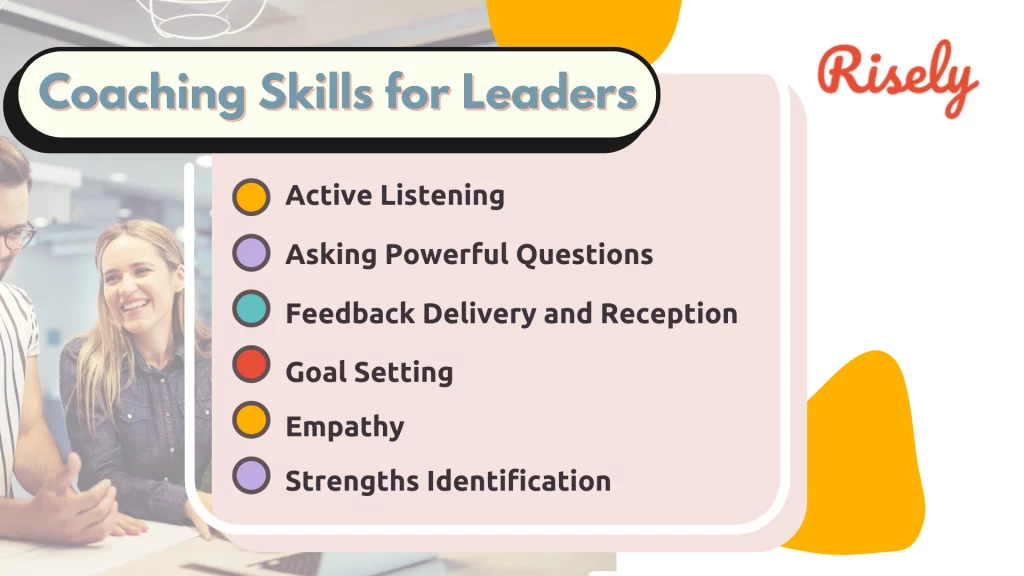6 Essential Coaching Skills for Leaders and How to Develop Them
Fulfilling the job of a manager needs us to wear multiple hats. Often, we find ourselves guiding our team members through situations they have not encountered before. The role of a manager as a guidance provider – instead of a mere instructor – is more relevant with changing times. The manager is no longer seen as an authoritative figure who only directs. Alternatively, a manager is a source of learning and support for employees. Coaching has become an important skill for managers and leaders. This blog explains why, how, and what managers can get from coaching their employees. By understanding the skill, management can develop in their role and become better leaders. So if you’re looking for a way to improve your management skills or a leader looking for ways to better work with your team, then read on!- 6 Essential Coaching Skills for Leaders and How to Develop Them
- What Are Management Skills?
- What is Coaching?
- What are the essential coaching skills for leaders?
- Why is coaching important in leadership? 6 Benefits of Coaching as a Leader
- How to be a coaching leader at work? Putting Coaching Skills for Leaders in Action
- How to improve coaching skills in the workplace?
- Conclusion
- Coaching Skills for Leaders and Managers FAQs
- Other Related Blogs
What Are Management Skills?
Management skills are the set of cognitive, social, and emotional skills necessary for managing people. These include things like attention to detail, problem-solving techniques, decision-making processes, communication abilities, skills, and team-building activities. Coaching is a form of support managers offer employees to help them develop these skills. It can be seen as an essential skill for managers because it allows them to provide guidance and support when their employees need it most. The skills of a good manager and leader are essential in any organization. By taking the time to learn and improve upon these skills, managers and leaders can lead and manage their teams to success.What is Coaching?
Coaching is a form of support managers offer employees to help them develop specific skills. Coaches typically work with individuals one-on-one, but managers can also adapt the approach for groups or teams. Many benefits come from getting coaching training and guidance. According to SHRM, coaching in a business environment is a training method in which a more experienced or skilled individual provides an employee with advice and guidance intended to help develop the individual’s skills, performance, and career. The effectiveness of this method is a function of both the coach and the client. Nonetheless, it is a practical method for developing skills needed on the job and facilitating relationship building among managers and team members. Moreover, leaders who turn into coaches can help their teams in several ways. Google’s Project Oxygen has highlighted being a good coach as one of the necessities of becoming a good manager. Along with providing essential guidance for work-related tasks, coaches can help resolve interpersonal issues. When the coaches come from experiences similar to those of the employees, understanding and empathy help create an emotional connection. All in all, a comfortable environment is created wherein the employees can work together to generate the best results for the team. Additionally, employees who work in a supportive environment are more likely to be actively engaged, and the teams will witness low turnover.What are the essential coaching skills for leaders?
Effective coaching skills for leaders support their team members’ growth, development, and performance. Here are some of the most fundamental coaching skills for leaders and managers:
Active Listening
The foundation of coaching is active listening. Leaders should listen attentively to understand their team members’ concerns, perspectives, and goals without interrupting or passing judgment. Adapt your coaching approach based on your team member’s needs, preferences, and learning styles. Communicate clearly and effectively in one-on-one coaching sessions and group settings to build a relationship that facilitates growth. Additionally, recognize and celebrate achievements, milestones, and improvements with your team members.Asking Powerful Questions
Leaders should be able to ask open-ended and thought-provoking questions that encourage team members to reflect, explore their thoughts, and arrive at their solutions. Assist team members in identifying and analyzing problems, exploring potential solutions, and making informed decisions to empower them as confident team members.Feedback Delivery and Reception
Providing constructive feedback is crucial to make coaching as a leader effective and that is why it is among the most crucial coaching skills for leaders. Leaders should offer feedback in a balanced and specific manner, focusing on behavior and outcomes rather than making it personal. Be open to receiving feedback from team members on the other side. Leaders should model the behavior they expect from their team and explain it through feedback exchange.Goal Setting
Help team members set clear and achievable goals aligning with their individual development and the organization’s objectives. Helping team members develop action plans that outline steps, timelines, and resources needed to achieve their goals is among the most important coaching skills for leaders. Coaching as a leader can be much more effective as you can align the team member’s goals with the organizational needs effectively.Empathy
Cultivating empathy to understand and connect with team members on a deeper level is one of the important coaching skills for leaders. It helps create a supportive and trusting coaching relationship. Establish trust and create a safe space where team members feel comfortable sharing their thoughts, challenges, and aspirations. In addition, a coach must recognize that growth takes time and be patient with the progress and setbacks of team members.Strengths Identification
Recognize and leverage the strengths and talents of team members to help them excel in their roles through effective analysis of skill gaps. Help team members develop action plans for growth that outline steps, timelines, and resources needed to achieve their goals. At times, you would come across team members with latent potential, and this is where your intervention as a coach can do wonders.Other Interesting Reads
Why is coaching important in leadership? 6 Benefits of Coaching as a Leader
Add Depth To Your Knowledge
Managers who turn into coaches get a fantastic opportunity to refine their knowledge. During their interactions with the employees, they can go over various topics. Moreover, they also get an occasion to discuss the new trends and changes in the industry. You will be able to identify the gaps in your skills when you set out to impart the same knowledge to someone else. Further, the coaching mode helps you understand blind spots in understanding concepts and situations. The questions and queries raised by your team members can raise interesting debates in your mind. You will get to explore and innovate with the nudge from an external perspective. It serves as an opportunity for skill development and focusing on continuous learning that will help you in professional development.Understand Your People
As a coach, you will get unparalleled insights into the inner workings of your employees. You will understand their motivations and how they perceive things. Additionally, as you interact with people daily, you get insights into their strengths and weaknesses that teams can leverage for better results. It enables you to mold their environment, so they stay motivated even when there are bumps in the road. Moreover, as people constantly evolve and grow, managers need to be open to various changes to flourish professionally. A coach can help engage with individuals at different stages of development and build close relationships with all. As a coach, you can take the best from the employees and integrate it into the overall strategy.Learn To Give Feedback
People often find it hard to give feedback. This is because it feels uncomfortable and judgmental. But, managing an impactful feedback loop is one of the crucial coaching skills for leaders. You need to be able to provide feedback in a constructive manner that helps the individual grow. You should also aim to provide corrective information instead of just giving criticism. It will help you learn an essential skill for managers. Becoming a coach will provide you with ample opportunities to practice giving feedback. Further, to give constructive feedback, you will sharpen your analytical skills as a manager.Become A Manager Who Leads By Example
As a coach, setting an example for the employees is essential. This means exhibiting a strong work ethic, staying present during meetings, and being proactive in problem-solving. You can enhance employee engagement by portraying a competent manager who leads by example. In order to become successful as a coach, you need to have excellent people skills and give constructive feedback effectively. Additionally, leading by example is critical in enhancing employee engagement levels. Moreover, you can train your team through your example in a coaching relationship. Hence, you become an inspirational figure for employees.Bring Out The Best In Your Team
As a coach, it is your responsibility to help individuals reach their full potential. You will do this by recognizing and celebrating their strengths. This will help them develop into their best selves. Additionally, it would help if you focused on coaching individual employees rather than managing teams as a whole. Coaching allows you to build emotional connections with the employees and understand their needs better. Ultimately, this results in greater employee engagement as they feel appreciated and understood by the manager. Apart from that, you can provide support as needed. In totality, you can take steps to build the most efficient team.Become An Indispensable Asset For Your Organization
As a coach, you are an essential asset to any company. This means that your work is organized, systematic, and efficient. Additionally, you can communicate effectively to build trust with the team members. Lastly, you take ownership of your coaching duties and deliver on what has been agreed upon between both parties upfront. With these qualities in place, it will be easy for the team to rely on and respect your skills as a manager or a leader. A manager who is an able coach as well is an excellent asset for any organization. Read more about How Coaching Style Is A Proven Way For Leaders To Grow Themselves!
How to be a coaching leader at work? Putting Coaching Skills for Leaders in Action
Although coaching has its benefits, the road to guidance can be rocky too! Here are a few things that you should consider when starting a coaching relationship –Establish Trust By Demonstrating Sincerity
Establishing trust is one of the most important things you need to do when starting any coaching relationship. This means being genuine and showing your true intentions. Start by stating your purpose for wanting to coach the individual and what you believe they can benefit from the most. Do not hesitate to share your personal coaching experiences to illustrate how valuable they can be. Additionally, ensure that you are clear about what will be expected from both parties during the session, as this will help them feel comfortable opening up about their concerns.Focus On Building A Rapport With Employees
It is important to remember that coaching is not about being critical, but instead, it should be focused on building rapport. This means getting to know the individual and understanding what makes them tick. Additionally, make sure that you focus on their strengths while acknowledging any weaknesses or areas where they can improve. The team members might be hesitant initially, and your approach needs empathy. Doing this will help create an open environment in which employees are more likely to share their concerns and feelings with you.Adopt A Flexible Approach
One of the most important things to remember when starting a coaching relationship is that it should be flexible. This means being open to change and adapting your approach as needed. The plan you begin with might not suit the employee. If an employee does not feel comfortable sharing their concerns, it may be best to wait until they are more relaxed before proceeding. Moreover, do not hesitate to ask for feedback from the individual after each session in order to gauge how well you are progressing. Therefore, we can clearly see that coaching is an important skill for managers that offers multiple benefits. It can often be difficult for managers or employees when starting any new type of relationship, but following these tips will create a thriving coaching experience!How to improve coaching skills in the workplace?
Improving coaching skills in the workplace requires a combination of self-awareness, continuous learning, practice, and Feedback. Here are some steps you can take to enhance your coaching skills:- Self-Assessment: Start by evaluating your coaching skills and identifying areas needing improvement. Reflect on your strengths and places where you can grow as a coach. You can check out assessments on the core areas, such as active listening, constructive feedback, and growth mindset, from Risely for free here.
- Training and Development: Invest in coaching training programs, workshops, and courses. Look for opportunities focusing on active listening, asking powerful questions, providing feedback, and other essential coaching skills. Additionally, you can learn by studying successful coaches, whether within your organization or in the industry.
- Practice Regularly: Practice is essential for honing your coaching skills. Engage in coaching conversations with your team members, peers, or mentors. Apply your newly acquired knowledge and techniques in real-life scenarios. After coaching interactions, you can also request feedback from your team members, peers, and supervisors. It can help you understand how your coaching style is perceived and identify areas for improvement.
- Set Goals: Set specific coaching goals for yourself. It could include improving your active listening skills, enhancing your ability to ask insightful questions, or providing more effective feedback. After each coaching interaction, reflect on what went well and what could be improved. Consider how you can apply lessons from each experience to future coaching conversations.
Conclusion
Coaching is an essential skill for managers and leaders because it helps them to improve their skills and develop professionally. It also allows managers and leaders to better understand their employees, the business, and the company’s overall goals. By starting with a good coaching relationship, aspiring leaders can develop management and relationship skills together successfully. So, if you’re looking to improve your skillset or build a better management relationship, coaching is definitely the way to go! Stay tuned for more helpful content.Master constructive feedback – an essential coaching skill for managers!
Get the free constructive feedback toolkit to become a pro coach for your team members today.
Coaching Skills for Leaders and Managers FAQs
What are effective coaching skills for managers?
Coaching skills for managers include their ability to guide improvements in team members. This leadership style focuses on enabling the growth of team members instead of getting work done. The essential skills include active listening, effective delegation, effective communication, and constructive feedback.
What are the three pillars of coaching?
The three pillars of effective coaching are: Self-awareness which helps learn and boosts personal growth. A responsibility that empowers the manager to turn into a guide. Self-belief in the ability to enhance someone’s skills and abilities.
What are the core coaching skills?
At its elementary stage, a good coach must be an effective listener and ask good questions. As a coach, it is critical to understand the concerns of the team member you are guiding. Additionally, asking questions clarifies how much they know and helps you plan better.
Other Related Blogs
Building a Coaching Culture with Jo Wright
Building a Coaching Culture with Jo Wright As AI takes over, we are all searching for the part that makes us truly human. For most managers and leaders, this search…
What is Immersive Learning? A New Era in Education
In this blog, you’ll learn what is immersive learning and how it is changing training, increasing engagement, and influencing the future of workforce development. … Read More
The Clear Coaching Models: A Revolutionary Approach to Coaching
This blog delves into the principles, significance, and applications of the CLEAR coaching models, exploring how they transform organizational development and enhance effectiveness. … Read More
Drive Meaningful Growth With The STAR Coaching Model
In this blog, we will explore the key elements of the STAR coaching model, outline effective implementation strategies, and discover best practices for enhancing coaching conversations. … Read More


